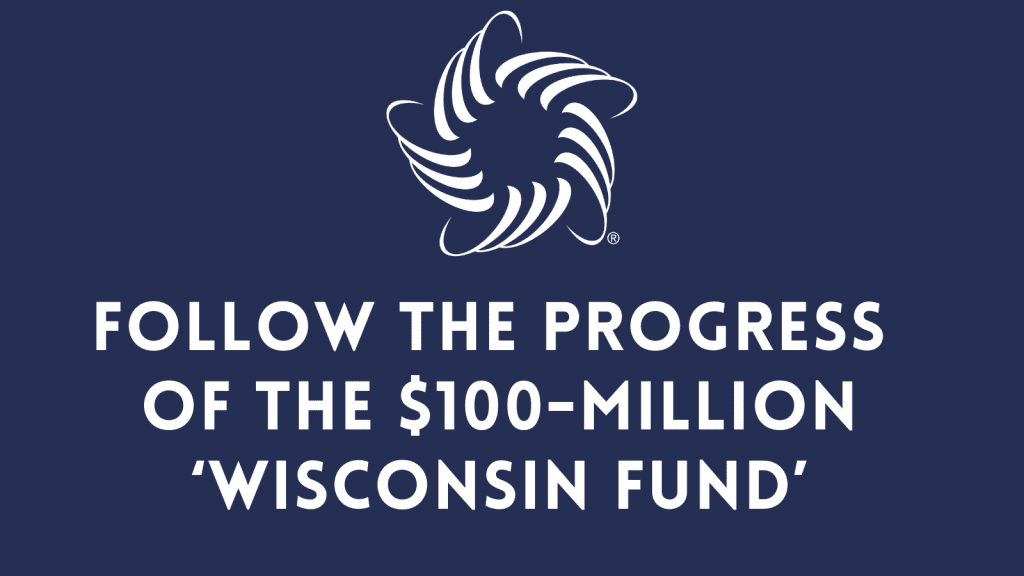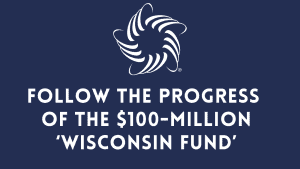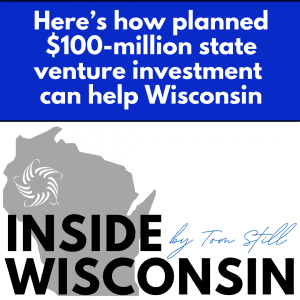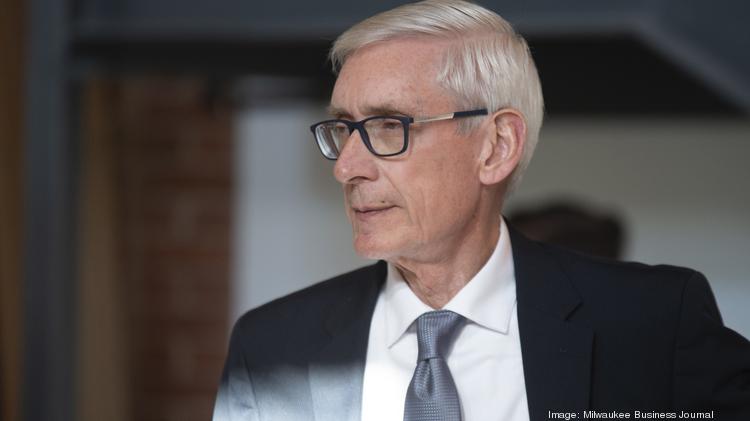
Track news/developments on Gov. Tony Evers’ fund-of-funds proposal
- Read the Tech Council’s 2021 “white papers” report for background on the fund-of-funds proposal, which has been a part of our policy recommendations since 2012.
- Read a FAQ on the $100-million “Wisconsin Fund”
- The “2021-23 Budget in Brief” is a summary of Gov. Tony Evers 2021-2023 budget proposal, which includes a $100-million venture capital “fund of funds” plan as well as other initiatives to spur economic growth. The document summarizes budget proposals across the board in state government, and will be subject to legislative review and approval. The next fiscal year begins July 1. Read the 2021-23 Budget in Brief here.
- Click here to watch a recording of the Wisconsin Technology Council 03/24/21 webinar on the $100 million dollar fund, featuring WEDC’s Sam Rikkers, MadREP’s Jason Fields, entrepreneur Karen Renee and Rep. Mike Kuglitsch.
WisBusiness: Investors, startup leaders backing $100 million fund of funds proposal 6/10/21
 Startup community leaders and investors alike are looking to rally support for a proposed $100 million state investment in a “fund of funds” contained in Gov. Tony Evers’ budget proposal.
Startup community leaders and investors alike are looking to rally support for a proposed $100 million state investment in a “fund of funds” contained in Gov. Tony Evers’ budget proposal.
“I’m excited about the venture fund because it’s the next step for Wisconsin,” WEDC CEO Missy Hughes said yesterday during a forum hosted by the Wisconsin Technology Council. “I hope that folks who are on the line and here can continue to advocate for this, and hopefully we can get this rolling and really create this magnet for venture capital.”
Under the proposal, the $100 million in state funds would be privately matched by recipient investors at a 2-to-1 ratio over time, according to an overview from the Tech Council. The group’s president, Tom Still, echoed Hughes’ call to action and urged participants to contact their legislators to express support.
Others backing the proposal include Milwaukee-based Generation Growth Capital Founder and Managing Partner Cory Nettles, who previously served as the state’s commerce secretary under then-Gov. Jim Doyle.
“This initiative by the governor for this $100 million fund of funds is vitally necessary and quite frankly long overdue,” he said yesterday, emphasizing the bipartisan nature of the Wisconsin Fund Coalition that’s supporting the proposal. He serves as the coalition’s co-chair.
As laid out in the governor’s budget proposal, this one-time investment would be accounted for in the pending state budget, which would run through mid-2023. If passed as part of the budget or as separate legislation, an advisory committee led by the Wisconsin Economic Development Corporation would begin the process of selecting a fund manager, who would then recruit recipient funds.
Still said if the proposal is passed as currently written, he expects six to eight recipient funds would be selected, with no one fund getting more than $25 million of the total state investment. He expects the fund could be set up within the first fiscal year after being passed.
“We hope, as a Tech Council and as a fund coalition, that it would attract money from elsewhere,” he said. “It’s never been that Wisconsin has done all that well at attracting money from other places… But other states in the Midwest have done this successfully, and have done it in a way that points the way for us.”
He pointed to states like Michigan, Indiana, Illinois, Ohio and others outside the region that have successfully launched state-backed funds to inject capital into their investment networks. During the calendar year 2020, he said Wisconsin saw $485 million in total investments, compared to $455 million in the prior year.
“But guess what — a lot of our neighbors did way better,” Still said. “Michigan had $3.1 billion in total angel and venture investing. That’s a big difference. Yes, Michigan is some bigger, but it’s still a huge difference and we can get there.”
Still contrasted the proposed fund of funds with the earlier Badger Fund of Funds, which was created in 2013 with $25 million in state funds and went on to raise another $10 million from the private sector. He noted that previous effort resulted in $3.3 dollars going to Wisconsin companies for every $1 invested in the fund. The proposed new fund would be a separate effort, but proponents expect it would have an even greater impact due to its larger size.
“Our state’s future has got to be about the start and the growth of high-performing companies,” Nettles said, noting entrepreneurs in the state are being drawn elsewhere by greater availability of venture capital. “There’s some green shoots in Wisconsin in this space, and this is our opportunity to really accelerate the growth of those green shoots by accelerating capital formation.”
–Alex Moe
Kenosha News [Editorial]: A rare survivor in budget feud 05/16/21
 The unrelenting feud between Democratic Gov. Tony Evers and the Republican controlled state Legislature was in full bloom this month as lawmakers scrapped nearly 400 items from Evers’ proposed budget and decided to start from scratch using the current budget as a base.
The unrelenting feud between Democratic Gov. Tony Evers and the Republican controlled state Legislature was in full bloom this month as lawmakers scrapped nearly 400 items from Evers’ proposed budget and decided to start from scratch using the current budget as a base.
Were there any survivors? Why, yes, there was at least one notable exception to the budget carnage: a $100 million state venture capital fund.
In a rare case of agreement, Evers’ proposal for a “fund of funds” to bring in outside investment to the state to support local businesses.
Evers’ proposal had the endorsement of eight former secretaries of the Wisconsin Economic Development Corp. – five who had been appointed by Republican governors and three by Democratic governors.
It even got some qualified support from assembly Speaker Robin Vos, R- Rochester, who said he “supported legislation in previous sessions that invested state dollars to increase venture capital available to Wisconsin companies. But before more public funding is put in I’d like to see some concrete results from past investments.”
The state already promotes venture capital with its Badger Fund, a $61 million fund that has distributed $20 million to five different funds to invest in companies. About $7.5 million of that has been paired with $24.5 million in private funding to support 24 businesses, according to USA Today reports.
The new fund of funds would follow that model. WEDC Secretary and CEO Missy Hughes said the fund “would allow Wisconsin entrepreneurs to secure needed next-step financing from in-state course so they don’t have to look to, or move to, the coasts for capital.”
Tom Still, president of the Wisconsin Technology Council, said other close-by states have such programs – including Michigan, Ohio, Indiana and Illinois. “When these companies do land, they produce a lot of revenue, a lot of jobs, a lot of salary and a lot of tax revenue.”
That, of course, would be good for the entire state of Wisconsin and Evers and Vos apparently see eye-to-eye on that.
Now only if such agreement could spread to other parts of the budget.
Wisconsin State Journal: Wisconsin should invest in its innovators by Missy Hughes 05/14/21
 From the electric guitar to stem cell therapies, entrepreneurs have demonstrated incredible ingenuity throughout Wisconsin’s history. Yet in recent years we have lagged in attracting investment to provide lifeblood to our startup companies — stifling their growth or forcing them to leave the state.
From the electric guitar to stem cell therapies, entrepreneurs have demonstrated incredible ingenuity throughout Wisconsin’s history. Yet in recent years we have lagged in attracting investment to provide lifeblood to our startup companies — stifling their growth or forcing them to leave the state.
As part of the 2021-23 state budget, Gov. Tony Evers proposed a $100 million investment fund under the direction of the Wisconsin Economic Development Corporation (WEDC) to promote innovation and startup growth. With the economy poised to recover from the COVID-19 pandemic, it’s time to lay the groundwork for our state’s economic prosperity — and innovative, adaptive companies are sure to play a vital role.
The Legislature’s Joint Finance Committee is working through the details of the state budget. If Wisconsin is going to make this bold vision a reality and claim its rightful place on the entrepreneurial landscape, this program must be included in the next budget. It already has bipartisan support from the last seven commerce and WEDC secretaries.
The Wisconsin Fund will support local entrepreneurs by serving as a pool of money available to venture capitalists investing in our state. For every two dollars invested in Wisconsin, we would match with one dollar — leveraging our investments against theirs and keeping those startups here. We won’t be in the business of managing the companies, and we could earn returns on our investment, which will be reinvested into future projects to help Wisconsin’s startups. Essentially, we would create a giant magnet for investment, pulling in dollars from the rest of the country for our home-grown innovators.
The effects of successful startups would be felt statewide and promote growth in cities such as Green Bay, Appleton, Eau Claire, Kenosha, Janesville, Beloit and more. Startups often buy supplies throughout the region and create jobs. High-growth companies also pay salaries that are well above the statewide average, which means more growth at the state and local level. Everyone wins when the economy innovates.
This “fund of funds” strategy is not new and has been implemented in various forms in many states including Michigan, Ohio, Illinois and Indiana. They all have attracted significant investment into their states, putting Wisconsin at a disadvantage we must overcome. And we have already learned a lot from the 2013 creation of the Badger Fund of Funds, which leveraged the state’s investment of $25 million with private investment dollars. Every state dollar invested through Dec. 31 of last year has been matched 3.3 times by private dollars. The Wisconsin Fund would take our commitment to our entrepreneurs to the national stage.
It’s also critical that the fund remain at the $100 million originally proposed so that it’s large enough to meet the demand to invest in our state. An informal survey of just eight early-stage investors in Wisconsin revealed they could collectively invest between $92 million and $116 million per year in their existing Wisconsin-only portfolios — not counting new companies they have yet to see or consider as investment targets.
Given this important time in our state’s history, we must build a more resilient and forward-looking economy. Our pump-priming funds will immediately encourage an expanded network of investors who would otherwise not be seeing Wisconsin-based deals. As we move past the COVID-19 pandemic, our state’s potential is limitless, and the time to act is now.
Can Wisconsin create a venture ‘fund of funds’? Hear about $100 million state plan March 24
 A state budget proposal to invest $100 million in a privately matched venture capital “fund of funds” will be the topic of a 11 a.m. Wednesday, March 24 webinar produced by the Wisconsin Technology Council.
A state budget proposal to invest $100 million in a privately matched venture capital “fund of funds” will be the topic of a 11 a.m. Wednesday, March 24 webinar produced by the Wisconsin Technology Council.
The webinar is the latest in the Tech Council Innovation Network’s continuing webinar series, “Crossing the Coronavirus Chasm.”
Tech Council Innovation Network and Investor Networks members may register at no charge; the price for non-members is $20 for general admission and $10 for students and returning veterans. Click here to register. The Tech Council’s Julie Johnson will be sending webinar credentials prior to the event.
Panelists include state Rep. Mike Kuglitsch, R-New Berlin, one of four co-chairs of the Legislature’s informal Tech Caucus; Sam Rikkers, deputy secretary of the Wisconsin Economic Development Corp.; and Burlington entrepreneur Karen Renee, president of eCourt Reporters. Tech Council President Tom Still will moderate.
“The $100-million state investment, which would require a 2-to-1 private match over time, would be a giant step forward in Wisconsin’s evolution as a welcoming state for emerging companies,” said Tom Still, president of the Tech Council. “A larger fund of funds will help put the state on par with our Midwestern neighbors.”
The Wisconsin Technology Council is the independent, non-profit science and technology adviser to the governor and Legislature, with events, publications and outreach that contribute to Wisconsin’s tech-based economy. To join, go to wisconsintechnologycouncil.com or call 608-442-7557.
WisBusiness: The Show features WEDC secretary Missy Hughes talking on the '100M Wisconsin fund' 3/9/21
 Welcome to “WisBusiness: The Show,” a twice-a-month Web show covering state business news and issues.
Welcome to “WisBusiness: The Show,” a twice-a-month Web show covering state business news and issues.
MADISON – The latest episode of “WisBusiness.com: The Show” spotlights Missy Hughes, secretary and chief executive officer of the Wisconsin Economic Development Corp. She outlines state budget plans to invest in a venture capital fund and to assist small businesses statewide.
Also, Tom Still gives a primer on the state budget process and updates the 2021 Wisconsin Governor’s Business Plan Contest. He’ll also preview upcoming Tech Council webinars and conferences, including:
- The March 17 Wisconsin Tech Summit, which will match emerging firms and major companies;
- A March 24 webinar on the $100-million proposal to build a larger venture capital “fund of funds,” and;
- An April 1 webinar featuring UW-Madison Chancellor Becky Blank and UW-Milwaukee Chancellor Mark Mone, who will discuss the economic value of research and development in the state.
Click below to view the latest episode of the show.
The show is sponsored by UW-Milwaukee, BDO and Exact Sciences.
Miss a show? Visit our archives HERE.
Wisconsin State Journal editorial: 3 big ideas must stay in Wisconsin’s budget 02/21/21
 Gov. Tony Evers’ state budget is strewn with wish-list policy items that fellow Democrats will love, such as repealing his predecessor’s union restrictions. Most have little chance of clearing the Republican-run Legislature.
Gov. Tony Evers’ state budget is strewn with wish-list policy items that fellow Democrats will love, such as repealing his predecessor’s union restrictions. Most have little chance of clearing the Republican-run Legislature.
But three of the governor’s major spending priorities deserve broad bipartisan support:
- Investing in our universities, especially UW-Madison.
- Encouraging more private investment in promising technology startups across the state.
- Expanding access to high-speed internet in rural areas.
The Brookings Institute just cited a handful of cities with major research universities — Boulder, Colorado; Iowa City, Iowa; Nashville, Tennessee; Pittsburgh and, significantly, Madison — that are well positioned to attract innovative companies and workers fleeing the East and West coasts because of congestion, pollution and soaring housing costs. The pandemic has taught high-flying techies they can work from just about anywhere if the Wi-Fi signal is strong and fast.
But investing in young talent and higher education is necessary to make that happen in Wisconsin.
“As coastal entrepreneurs and tech companies consider taking up residence in America’s heartland,” John C. Austin writes for Brookings this month, “there is a real opportunity to reshape the nation’s lopsided employment picture — let’s not waste it by neglecting our public universities.”
To his credit, Gov. Evers wants to seize this opportunity. His $91 billion, two-year state budget request, unveiled Tuesday, includes a $190 million increase for the University of Wisconsin System. Some of that money would allow UW System to avoid tuition hikes and expand scholarships. That would help students and their families while addressing sagging enrollment. Some of the increase in state funds would keep students and staff safe from COVID-19 while filling a shortage in nursing educators.
Just as promising is the governor’s request for a $100 million investment in a venture capital fund to expand startup businesses with creative ideas developed across Wisconsin. The fund would leverage at least twice as much in private dollars, and the state could earn income from the fund over time. In Ohio, for example, a similar commitment of $130 million in state money helped to attract more than $1.3 billion from private investors for 107 companies, according to the nonprofit Wisconsin Technology Council.
Inside Wisconsin: Here’s how planned $100-million state venture investment can help Wisconsin 2/18/21
By Tom Still
 MADISON, Wis. – Leading up to the news of a proposed $100-million state investment in a venture capital fund, the Wisconsin Technology Council informally surveyed a small group of early-stage investors about the “demand” side of the equation.
MADISON, Wis. – Leading up to the news of a proposed $100-million state investment in a venture capital fund, the Wisconsin Technology Council informally surveyed a small group of early-stage investors about the “demand” side of the equation.
Our informal query of eight such investors in Wisconsin revealed they could collectively invest between $92 million and $116 million per year in their existing Wisconsin-only portfolios – not counting new companies they have yet to see or consider as investment targets.
There are at least three-dozen active angel networks, angel funds and venture capital funds in Wisconsin, most of which investing predominantly in emerging companies close to home. That means there’s likely more than enough “deal flow” – a term describing the supply of young, high-growth companies – to merit such a fund.
As part of the 2021-2023 state budget bill, Gov. Tony Evers proposed investing $100 million in a “fund of funds” that would require a two-to-one private sector match. It’s a move akin to what other states, including Wisconsin’s Midwest neighbors, have made over time – and it’s the right move. Here’s how the Evers proposal, which would require legislative approval, would work.
Think of a fund of funds as a pool of venture capital organized under a central fund, which acts much like an umbrella. That central fund would invest in related “recipient” funds – perhaps early-stage funds already existing in Wisconsin – to deploy capital over time in high-growth companies.
While it’s new to the governor’s budget bill, similar investments have been made by other states in the Midwest and around the country. Illinois, Indiana, Ohio and Michigan all have larger funds of funds, although their formats and funding sources vary.
Given the economic strain of COVID-19 in Wisconsin, some may ask, why now for such a fund?
The Wisconsin economy has certainly been hit by the pandemic, but parts of that economy have stayed solid and are emerging even stronger. The “innovation economy” is one of those places. The National Venture Capital Association recently reported that 2020 was a banner year for U.S. investing, despite COVID-19. Investment opportunities in Wisconsin are growing, not shrinking.
Such a fund can help statewide, not just in those cities with mature tech clusters.
First, Wisconsin’s high-growth economy is expanding in places outside the traditional centers of such activity. That includes cities such as Green Bay, Appleton, Eau Claire, Kenosha, Janesville, Beloit and more.
Second, young high-growth companies buy goods and services throughout the state. That supply chain has been demonstrated to help many non-venture-backed companies.
Third, high-growth companies pay salaries that are often 50% above the statewide average – which means more tax revenue, over time, to help pay for other state priorities.
The timing of the Evers proposal is right for another reason: It will build on a strong foundation of previous investments. Angel and seed investors in Wisconsin have carried a lot of the freight over time, often making some of the riskiest early-stage investments. No one wants those investments to get “stranded” for lack of follow-on dollars, often referred to as Series A or Series B rounds.
Right now, too many promising, young companies in Wisconsin have trouble crossing the “valley of death,” which is most often bridged by Series A dollars.
Finally, the $100 million state investment will call out Wisconsin to investors, companies and talent on the East and West coasts, where there’s been something of an exodus in search of greener pastures. Wisconsin could attract more investment dollars – a trend that is already underway – by establishing a larger fund of funds.
The Evers proposal is not a loan or a grant. It’s an investment designed to generate a positive return. The state of Wisconsin would be a full partner, just like the private investors, and oversight would help to protect taxpayers. The proposal would also reach out to people who may not see many early-stage opportunities today.
No venture capital investment is ever guaranteed, but with the right structure and skilled fund managers, the overall return on investment can help to expand the Wisconsin economy while protecting its taxpayers.
Still is president of the Wisconsin Technology Council. He can be reached at tstill@wisconsintechnologycouncil.com.
Milwaukee Business Journal: Gov. Evers' budget to include $100M for new venture capital program to grow Wisconsin startups 02/16/21
Wisconsin Gov. Tony Evers has announced his 2021-2023 budget will include funding for supporting early-stage and small businesses in Wisconsin.
Part of that budget plan is allocating $100 million for a fund of funds venture capital program that will invest in other venture funds that back startups with high-growth potential.
The venture capital program would be under the direction of the Wisconsin Economic Development Corp., and no investment made by the fund of funds into a separate venture fund may exceed $25 million, according to the announcement from Evers’ office. The funds that receive investments from Wisconsin must commit to investing that amount into Wisconsin and must match what it received with private dollars at a one-to-one match ratio, at the least, to help the program meet a required two-to-one private\state match ratio over time.
The state is also requiring funds that receive investments from Wisconsin to have at least 20% of total funds under management be invested in minority-owned or women-owned companies or companies that are located in underserved areas.
The action by Evers adds to an existing venture program backed by the state. In 2013, the state of Wisconsin allocated $25 million to establish the Badger Fund of Funds, which raised an additional $5 million from the private sector and agreed to create six to eight venture capital firms across the state.
Running the program is Santa Fe, New Mexico-based Sun Mountain Capital, which specializes in regional investment programs, and Wisconsin-based Kegonsa Capital Partners.
The Badger Fund of Funds supplies a certain percentage of capital into new funds and the rest of the money is raised from private investors. Badger recipient funds include the Idea Fund of La Crosse, the Winnebago Seed Fund, Gateway Capital Fund in Milwaukee, and Madison’s Winnow Fund and Rock River Capital Fund.
“Compared to our Midwestern peers, Wisconsin has historically struggled to create a robust venture capital ecosystem” said Matt Cordio, co-founder of the Wisconsin Startup Coalition and Startup Milwaukee. “The creation of a new venture capital fund of funds program would attract significant private sector investment, stimulate job growth and drive long-term economic growth across the State of Wisconsin.”
Wisconsin companies raised $273.1 million across 77 deals in 2020, according to Seattle firm PitchBook, which collects data on venture and private equity deals. In 2019, Wisconsin companies raised $214.5 million across 73 deals, and $443 million in 2018 across 84 deals.
To compare, Illinois companies raised $2.8 billion in 2020; Minnesota companies raised $1.8 billion; Ohio companies raised $1.5 billion; Michigan companies raised $558 million and Indiana companies raised $318 million.
Nationwide venture investments exceeded $156.2 billion in 2020, the highest ever, per PitchBook, which stated the record number “demonstrates the resilience and long-term mindset of the VC industry at large.”
“Wisconsin has the talent, technology, research base and business climate necessary to attract more investment capital,” said Tom Still, president of the Wisconsin Technology Council. “This fund will make Wisconsin more competitive among its neighbors and well beyond.”
Of the Wisconsin deals in 2020, 37 were by Madison-area companies, amassing $203 million, $112 million coming in the fourth quarter. Twenty-three deals were made by companies located in the Milwaukee-Waukesha-West Allis metro area, and eight were in the fourth quarter. The Milwaukee metro area accounted for $40 million, and $19.6 million in the fourth quarter.
Meanwhile, venture firms in Wisconsin raised $427 million in 2020, a record high, per PitchBook.
StartingBlock Madison Praises Governor’s Budget in Support of Entreprenuership in Wisconsin 02/16/21
On February 14, 2021 Governor Tony Evers announced that his 2021-2023 executive state budget will include the following highlights to encourage entrepreneurship and innovation for all Wisconsinites:
-$100M new venture capital fund of funds with emphasis on historically underrepresented entrepreneurs
-$8M to support entrepreneur support organizations like StartingBlock, the Doyenne Group, Capital Entrepreneurs, or the UW Law & Entrepreneurship Clinic
-$10M to promote underrepresented entrepreneurs through direct investments
-$200M for broadband expansion & access throughout the State a proposal to create a -$100 million venture capital fund of funds program under the direction of the WEDC to jumpstart innovation and startup growth in Wisconsin
“At StartingBlock, we are passionate about providing opportunities for all entrepreneurs. The Governor’s budget identifies priorities that we share as an organization and we enthusiastically support this direction on behalf of the entrepreneurs we serve in Madison and throughout the state of Wisconsin,” said Nora Roughen-Schmidt, Executive Director of StartingBlock Madison.
Scott Resnick, COO of Hardin Design & Development and StartingBlock Madison Board Member referred to the Governor’s callout to BIPOC entrepreneurs and women as extraordinary. Adding, “With these investments, the State is sowing the seeds for the next generation of Wisconsin businesses to start, catalyze, and grow. We applaud these initiatives to invest in our own local entrepreneurs in every corner of the State.”
“It’s going to take contributions and innovation from, and support for, all kinds of entrepreneurs to jumpstart our economy. Let’s be better coming out of COVID than we were going in. For too long we’ve had a narrow view of what an entrepreneur looks like or what kind of businesses fit that definition. Great ideas can come from anyone and anywhere. We are committed to broadening where we look to find them,” said Mark Richardson, Co-Chair of the StartingBlock Madison Board of Directors.
Madison entrepreneur, and CEO of RehabPath, Ben Camp supports the decision by Governor Evers to offer assistance to entrepreneurial support organizations like StartingBlock. “Much of our success in the past 18 months can be traced back directly to our decision to move to StartingBlock. Through the connections made at StartingBlock we’ve received the majority of our investment to date, added a key consultant that has helped us more than double our monthly revenue in the past 6 months, and even made a recent full time hire of someone who had interned at another StartingBlock company. Although these connections were serendipitous, they weren’t accidental. Startingblock has successfully built the infrastructure around us that made forming these types of relationships possible. “
“The Governor’s budget represents a substantial investment in Wisconsin’s current and future entrepreneurs as well as the support networks and resources that they rely on to be successful,” said Forrest Woolworth, StartingBlock Madison Board Co-Chair and COO of PerBlue. “Entrepreneurship is a really powerful tool that creates opportunities which lead to economic empowerment for individuals and entire communities.”
“There are many reason’s Doyenne considered StartingBlock home and also a key strategic partner of the organization, one of the main reasons is their mission of being an entrepreneurial hub for all entrepreneurs,” states Doyenne Group, Inc. Executive Director & Co-founder Heather Wentler. “Governor Evers’ commitment to putting dollars into the hands of diverse entrepreneurs is addressing the pipeline issue we continually talk about as to why we don’t see more growth and success coming from ventures here in our state. Wisconsin has all of the key ingredients to be a leading state in the country for entrepreneurs to build their ventures and have access to the talent and resources required for success. By designating budget dollars into this space, Wisconsin is increasing economic prosperity for current and future business owners and our communities.”
StartingBlock Madison looks forward to working with policymakers as advocates for entrepreneurship in Wisconsin.
About StartingBlock Madison:
StartingBlock Madison is Madison’s startup hub created by entrepreneurs for entrepreneurs. Our mission is to create the meaningful intersections that cultivate entrepreneurs, grow successful companies, drive innovation and build a startup community that gives back. Through collaborations with existing business leaders and partner organizations, such as Doyenne Group, gener8tor, Capital Entrepreneurs, and others, StartingBlock is helping galvanize Madison and Wisconsin into a global leader in entrepreneurship. www.startingblockmadison.org
Media Contact:
Nora Roughen-Schmidt, Executive Director
StartingBlock Madison 821 E. Washington Ave Suite 200 Madison, WI 53703 | nora@startingblockmadison.org
WisBusiness: One of Tech Council's top priorities for years has been the new $100-million venture capital fund 02/15/21
The Wisconsin Tech Council is backing Gov. Tony Evers’ call for a new $100 million venture capital fund, saying it’s been one of the group’s priorities.
“Wisconsin has the talent, technology, research base and business climate necessary to attract more investment capital,” Tom Still, council president, said. “This fund will make Wisconsin more competitive among its neighbors and well beyond.”
The Main Street Alliance of Wisconsin, a network of values-based small businesses, is also praising Evers’ plan, which also calls for $200 million to help small businesses through the Wisconsin Economic Development Corp. and $29 million for workforce development.
The guv’s plan also includes $1 million in the Fast Forward program to train workers in green jobs, which won RENEW Wisconsin’s support. The organization said the investment would tackle a shortage of trained workers in the rapidly growing clean energy sector.
“The construction of clean energy projects not only creates thousands of good paying jobs, but it keeps billions of our energy dollars right here in Wisconsin,” said Heather Allen, executive director of RENEW. “Without our own trained workforce, many of these clean energy projects may not get built or will be built by out-of-state companies and crews. We can’t afford to let that happen.”
In rolling out the budget initiatives Sunday, Evers touted the $240 million WEDC’s We’re All In grant program gave to nearly 55,000 businesses to help them during the pandemic. He said the budget he will introduce tomorrow will build on that effort.
“These investments will ensure our main street businesses, our workers, and our state bounce back and better than before by helping folks recover from this pandemic while investing in new innovation and startups,” Evers said.
“Compared to our Midwestern peers, Wisconsin has historically struggled to create a robust venture capital ecosystem,” added Matt Cordio, Co-founder of the Wisconsin Startup Coalition. “The creation of a new venture capital ‘fund of funds’ program would attract significant private sector investment, stimulate job growth and drive long-term economic growth across the State of Wisconsin.”
See the Evers release: https://www.wispolitics.com/2021/gov-evers-announces-badger-bounceback-budget-investments-to-support-small-business-kickstart-innovation/
See the Tech Council release: https://www.wisbusiness.com/2021/wisconsin-technology-council-evers-budget-plan-for-100-million-fund-praised-by-wisconsin-technology-council/
See more in the WisPolitics.com Budget Blog.
BizTimes Milwaukee: Evers’ proposed $100 million VC fund an important step to support Wisconsin startups, supporters say 02/15/21
 Wisconsin’s startup ecosystem leaders are calling Governor Tony Evers’ proposal for a $100 million venture capital fund a bold but necessary step for economic recovery and the prosperity of the state’s entrepreneurial ecosystem.
Wisconsin’s startup ecosystem leaders are calling Governor Tony Evers’ proposal for a $100 million venture capital fund a bold but necessary step for economic recovery and the prosperity of the state’s entrepreneurial ecosystem.
Evers released details of his economic plan Sunday which included a new $100 million venture capital fund to foster growth among Wisconsin-based startups as well as $200 million to assist small business impacted by the coronavirus pandemic.
The proposed “Wisconsin Fund” is a fund of funds model, meaning the fund will invest in a minimum of four established recipient funds, which will in turn make investments in Wisconsin-based companies.
Under the proposal, Wisconsin would become an investor alongside private investors, who must match the $100 million state investment with $200 million in collective investments of their own.
Individual investments could be made with a 1-to-1 private/state match, but the overall fund matching requirement over time would be 2-to-1, private to public, according to a press release.
The Wisconsin Fund would make an investment of no more than $25 million in each fund – the idea of multiple recipient funds is to spread risk while supporting multiple fund managers who have varying expertise and the ability to reach different communities, said Tom Still, Wisconsin Technology Council president.
Securing capital for new businesses has long been a challenge for Wisconsin, which is why a fund of this size is critical for entrepreneurial growth in the state. Early-stage companies may be able to raise a first round of funding from family, friends or angel investors, but it’s the next stage of funding that has historically served as a barrier for startups, Still said.
“The promise of this fund is that it will continue a maturation process for young companies as they move along to truly become revenue producing, profitable and job creating,” Still said.
Evers’ proposal calls for the Wisconsin Economic Development Corp. to establish an oversight board for the new fund. At least 20% of the individual companies receiving an investment from a recipient fund must be women-led or minority-led and rooted in underserved communities, an aspect of Wisconsin’s model that is unique among other state-backed funds in the country, said Missy Hughes, WEDC secretary and chief executive officer.
“The taxpayers would agree that now is the time to be bold,” Hughes said. “Now is the time to think about what it’s going to take for Wisconsin to have a full and strong recovery and a recovery that includes all of our communities and all of the vulnerable people that have been impacted by the pandemic.”
Another major aspect of the Wisconsin Fund is that it will be evergreen, meaning proceeds could be re-invested in perpetuity. If Evers’ budget proposal is approved by the Wisconsin Legislature, the same evergreen clause will be extended to the Badger Fund of Funds, a $25 million state-backed fund created in 2010 to support Wisconsin-based startups.
Evers’ proposal has been met with support from Wisconsin’s broader startup ecosystem, including the Wisconsin Startup Coalition, an organization whose mission is to advocate for policies that advance growth in Wisconsin’s startup ecosystem.
“It is critical to build a vibrant innovation ecosystem in Wisconsin to ensure the long-term health of the state’s economy,” said Matt Cordio, co-founder of the Wisconsin Startup Coalition. “A venture capital fund of funds program will stimulate net new job growth, add to our state’s tax base and enhance the economic vitality of the state. It’s a smart investment to make now to ensure Wisconsin emerges stronger from the COVID-19 pandemic.”
Click here to read the full article.
by Brandon Anderegg
Wisconsin State Journal: Gov. Tony Evers proposes $100M for new venture capital fund 02/15/21
Gov. Tony Evers will propose more than $329 million in new economic development initiatives as part of his state budget proposal on Tuesday, including a new $100 million venture capital fund to help startups and $200 million to assist small businesses hurt by the COVID-19 pandemic.
Evers released details of his economic development plan on Sunday. He will submit his two-year state budget proposal to the Republican-controlled Legislature on Tuesday, which will then spend months reworking it before passing its own version this summer.
Evers, a Democrat, said the economic development proposals are designed to help small businesses hurt by the coronavirus pandemic. Republicans have blamed Evers for hurting businesses with his “safer at home” order last year that forced all non-essential businesses to close. Republicans successfully challenged the order, which the Wisconsin Supreme Court struck down in May, after it had been in effect less than two months.
“Over the past year, our small businesses have seen the effects of this pandemic firsthand,” Evers said in a statement. “These investments will ensure our main street businesses, our workers, and our state bounce back and better than before by helping folks recover from this pandemic while investing in new innovation and startups.”
Securing capital for new business startups has been an ongoing issue for years in Wisconsin. Evers is proposing a new $100 million venture capital program that will make awards of up to $25 million. Recipients must match the award with private money and invest in Wisconsin. At least 20% of the money being managed will be invested in minority-owned or women-only firms.
The plan calls for the Wisconsin Economic Development Corp. to create an oversight board to manage the program.
Evers is also calling for an additional $200 million to go to WEDC to assist businesses in recovering from the pandemic, including assistance for job retention and hiring. He also wants to increase an existing block grant at WEDC by $10 million, for a total of $51.5 million a year, that’s used for a wide range of programs.
His budget will include:
- $10 million to promote entrepreneurship in underserved communities, including minority and women-owned businesses.
- Nearly $10 million for a new program within the Department of Workforce Development to help people overcome barriers to meaningful employment.
- $8 million for pandemic recovery grants to local workforce development boards.
- $8 million for organizations focused on local or regional economic development.
- $10 million for the Fast Forward program to support training for individuals, businesses, and organizations affected by the pandemic.
- $1 million more for training through that program targeting jobs in conservation and sustainability.
- Using $780,000 in tribal gambling revenue to support businesses and communities among the state’s 11 American Indian tribes.
- $500,000 to expand youth apprenticeship opportunities.
Evers has announced several other budget proposals ahead of the release of his plan on Tuesday. That includes accepting federal Medicaid expansion to help pay for $150 million in mental health programs; legalizing medical and recreational marijuana; lowering prescription drug costs; creating a $500 caregiver income tax credit as part of a $600 million investment in long-term care; allowing counties and larger cities to impose a new half-cent sale tax; and expanding programs to benefit agriculture and rural Wisconsin.
Main Street Alliance: Wisconsin Small Businesses Applaud Governor Ever's budget announcement 02/14/21
Wisconsin Small Businesses Applaud Governor Ever’s budget announcement re: Badger Bounceback Budget Investments to Help Main Street Businesses across WI.
Michelle Tressler, VP and Co-Owner of Hinterland Brewing had this to say:
“It is great to see that Governor Evers is prioritizing support for Wisconsin families, businesses and farmers throughout the state. As the Vice President and Co-Owner of Hinterland Brewing in Ashwaubenon we have seen the impact of COVID-19 in our community, including the loss of business from fewer home-game fans.
While we strongly support public health measures we also appreciate government officials like the Governor who are working to provide much needed support to bounce back better than ever. We are especially excited about the grants, workforce development investments, targeted aid for the most impacted communities and efforts to help entrepreneurs across our state get the capital they need to start, grow and thrive.”
Dave Heide, owner of Little John’s and Liliana’s in Madison added:
“During this crisis we have pivoted and worked hard to provide meals to those in need. Working with local non profits during the pandemic we have provided over 32,000 meals to those in the Dane County area. We had Dane counties back and now it’s great to see that the Governor is working to have ours by proposing this groundbreaking investment in main streets across our state. There is still more work to do, and our sleeves are fully rolled up to get it done, but it’s helpful when we know the ‘back of house’ is helping us make sure the ‘front of house’ is getting the job done.”
Main Street Alliance and its small business members look forward to working with Governor Evers and the Wisconsin State Legislature to ensure policies that support small businesses like the ones outlined today are enacted and implemented.
Main Street Alliance of Wisconsin is part of a national network of values-based small business owners who have united around public policy issues impacting their businesses, their employees, and the communities they serve.
Shawn Phetteplace, Main Street Alliance
http://www.mainstreetalliance.org/
Gov. Evers Announces 'Badger Bounceback Budget Investments' to Support Small Business, Kickstart Innovation 02/14/21
Gov. Tony Evers today announced his 2021-23 budget will include aggressive economic development plans that invest more than $200 million in assisting small businesses, more than $29 million for workforce development initiatives, and a new $100 million venture capital program to jumpstart innovation as all part of his Badger Bounceback agenda to help the state’s economy rebound, rebuild, and recover.
“Over the past year, our small businesses have seen the effects of this pandemic firsthand. I am proud of our small businesses and of the critical investments we made with our We’re All In grant program, but we know we have more work to do in making sure we can recover from this pandemic,” said Gov. Evers. “These investments will ensure our main street businesses, our workers, and our state bounce back and better than before by helping folks recover from this pandemic while investing in new innovation and startups.”
Helping Wisconsin Businesses Bounce Back
During the COVID-19 pandemic, Wisconsin was able to respond quickly to the needs of businesses through the Wisconsin Economic Development Corporation’s (WEDC) We’re All In grant program, providing nearly 55,000 small businesses a total of approximately $240 million to help weather the pandemic. Building off of this success, the governor’s Badger Bounceback agenda creates a biennial appropriation to provide the WEDC with $200 million to assist Wisconsin’s small businesses recover from the global pandemic, including assistance for job retention and rehiring.
Additionally, the governor is proposing increasing WEDC’s annual block grant by $10 million in each year of the biennium to bring the total investment to $51.5 million per year, providing WEDC with additional resources across its range of programs to assist businesses, communities, and organizations. In order to ensure that the state’s economic investments are felt statewide and in an equitable manner, the Gov. Evers’ proposal includes:
- Providing a one-time $8 million investment for WEDC to award to organizations focused on local or regional economic development;
- Promoting entrepreneurship in underserved communities, including minority and women-owned businesses, with $10 million in direct investment activity; and
- Supporting tribal economic development by providing $780,000 in tribal gaming revenue over the biennium to support business and communities among Wisconsin’s 11 federally recognized Native Nations.
Workforce Initiatives
The governor recognizes Wisconsin’s economy is only as strong as its workforce. That’s why Gov. Evers is proposing to:
- Provide $8 million over the biennium in funding for pandemic recovery grants to local workforce development boards;
- Invest $10 million over the biennium in the Fast Forward program supporting training for individuals, businesses, and organizations affected by the pandemic;
- Providing an additional $1 million over the biennium in the Fast Forward program for training specifically in green jobs throughout the state, encouraging career paths in conservation and sustainability;
- Transferring $250,000 from the Fast Forward program to provide greater resources for young adults with disabilities through Project SEARCH;
- Providing $500,000 over the biennium to expand youth apprenticeship opportunities to more school districts and youth throughout the state; and
- Creating a new “customer centric” worker program within the Department of Workforce Development with Career Coaches to assist individuals in overcoming barriers to meaningful employment with a $9.7 million investment over the biennium.
Venture Capital Investment
In addition to short-term recovery initiatives, the governor recommends numerous proposals to enhance Wisconsin’s long-term economic growth prospects in the years ahead. Now, more than ever, is the time for Wisconsin to recommit to innovation and economic growth to come out of the COVID-19 pandemic stronger than ever. The largest of these proposals is the creation of a $100 million venture capital fund under the direction of the WEDC to jumpstart innovation and startup growth in Wisconsin.
The program will be a fund of funds investment program, and no investment made by the fund of funds in a recipient venture capital fund may exceed $25 million. Venture capital funds receiving investment from the fund of funds program must commit to investing that amount in Wisconsin and that these investments must attain at least a one-to-one match with private sources, such that the program as a whole attains a required match rate of two private dollars for every state dollar invested. The program will require that at least 20 percent of the total funds under management be invested in minority-owned or women-owned firms or in businesses that are located in underserved areas. WEDC will establish an oversight board with various enumerated responsibilities related to the establishment and management of the program. Both investments made by this new fund, as well as investments made by the Badger Fund of Funds, will be able to be reinvested in perpetuity.
Evers budget plan for $100-million fund praised by Wisconsin Technology Council 02/14/21
Gov. Tony Evers’ plan to invest $100-million in a venture capital “fund of funds” will help young high-growth companies throughout Wisconsin and put the state on the map for tech workers, companies and investors for years to come.
That endorsement of the proposal to be outlined in Evers’ 2021-23 budget bill was made Sunday by Tech Council President Tom Still and Greg Lynch, the chair of the Tech Council’s 50-plus member board of directors.
A fund of this size and scope has been a specific goal of the Tech Council since 2012 and was renewed in the 2021 edition of the council’s “white papers” report.
“Wisconsin has the talent, technology, research base and business climate necessary to attract more investment capital,” Still said. “This fund will make Wisconsin more competitive among its neighbors and well beyond.”
“Companies and investors on the coasts are looking for new opportunities. This fund will send a strong, timely message that Wisconsin offers just such an opportunity,” Lynch said.
The proposal would make the state an investor alongside private investors, who must match the $100-million state investment with $200 million in collective investments of their own. As a “fund of funds,” the larger fund would work with other “recipient” funds – perhaps similar funds already existing in Wisconsin – to deploy capital over time in high-growth companies.
Individual investments could be made with a 1-to-1 private/state match, but the overall fund matching requirement over time would be 2-to-1, private to public. No single recipient fund could receive a state investment exceeding $25 million, which means multiple recipient funds are envisioned for risk mitigation and sector diversity.
At least 20 percent of the individual companies receiving an investment from a recipient fund must be women-led or minority-led and rooted in underserved communities. Studies indicate investments by such funds perform well in their returns.
The fund of fund would be “evergreen,” meaning proceeds could be re-invested in perpetuity. If the budget proposal is approved by the Wisconsin Legislature, that same evergreen clause will be extended to the existing Badger Fund of Funds. The Badger fund was created with a $25-million state investment in the mid-2010s and has attracted private investors while putting dollars into promising early-stage firms across the state. The Tech Council led the private effort for its creation at the time.
The Evers proposal also calls for the Wisconsin Economic Development Corp. to establish an oversight board for the new fund.
The Tech Council was incorporated in 2001 to serve as the independent, bipartisan and non-profit science and technology advisory board to state government. Its directors hail from all sizes of private business, the investment community, academic research institutions, health care, law, accounting and other disciplines tied to the tech-based economy.


